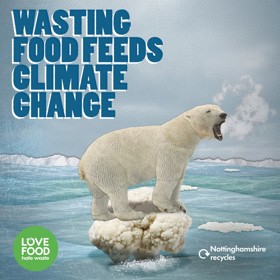
The second annual Food Waste Action Week begins today, Monday 7 March, with Nottinghamshire County Council and its partner Veolia joining the efforts to reduce waste. Food Waste Action Week aims to raise people’s awareness of the huge impact of household food waste on climate change and share practical advice, food savvy behaviours and tips on how we can all easily reduce the amount of food we waste in our homes.
We throw away 6.6 million tonnes of household food waste a year in the UK. This food waste is responsible for nearly 25 million tonnes of CO2 emissions, equivalent to 5.4% of the UK’s territorial emissions. The majority, 4.5 million tonnes, is food that could have been eaten and is worth approximately £14 billion (or £60 a month for an average family with two children). It requires an area almost the size of Wales to produce all the food and drink currently wasted in the UK.
Nottinghamshire County Council will be helping local residents cut down on their food waste by sharing hints and tips on social media using the hashtag #NottsRecycles. These will include videos on food storage and ‘how to’ cook exciting meals using leftover ingredients.
Councillor Neil Clarke, MBE, Chairman of the Transport and Environment Committee at Nottinghamshire County Council said: “Reducing food waste is so important in the battle against climate change and that is why it’s so important to let residents know about Food Waste Action Week and the steps they can take to cut down on their food waste. If we all do our bit and make a concerted effort to plan meals, only buy what we need and use up our leftovers, we will reduce our food waste and minimise the impact we each have on our planet.”
Last month Nottinghamshire County Council further underlined its commitment to reducing food waste to help tackle climate change by launching its Food Charter, which sets out the Council’s priorities to improve the local food system in the county over the next four years. This includes ambitions to reduce food waste in schools, hospitals and other public sector catering, and to grow more food in the county to enhance biodiversity and tackle climate change.”
Love Food Hate Waste runs an annual survey of people’s habits and knowledge around food waste. This highlighted that 81% of UK citizens are concerned about climate change, but only 32% see a clear link with food waste. The survey helped to inform the theme of the Week and the development of materials to motivate people to act. This year, Love Food Hate Waste found that the public’s relationship with its freezers has become particularly frosty with many people not knowing how to safely freeze and defrost their food.
Lea Hawkes, General Manager at Veolia Nottinghamshire said, “At a time of rising food prices alongside huge public concern about climate change, tackling food waste at home is one way we can all make a difference and save money. For the average family with children, the cost of binning food can be more than £700 per year. Simple things like freezing leftovers or reusing them in new recipes really can make a difference to both the planet and our purse strings.”
Love Food Hate Waste is keen to show that used properly, the freezer is the king of the kitchen. In fact, freezing and defrosting just three key meat items that are commonly not used in time (fresh chicken, bacon, and sausages) could reduce waste of those items by as much as 15,000 tonnes per annum. And, when it comes to defrosting, busy households can avoid a lengthy overnight defrost by using their microwave instead – as people use a toaster to defrost sliced bread from the freezer.
Working together, we can prevent food being wasted needlessly and protect the planet. For more information about the ways in which Nottinghamshire County Council and Veolia are working together to help residents reduce their food waste, including details of the Nottinghamshire sustainable cookery book, which is free to download, visit: www.veolia.co.uk/nottinghamshire/waste-reduction/food-waste-reduction.
ENDS
